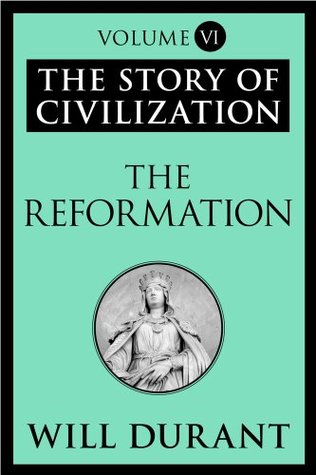More on this book
Kindle Notes & Highlights
by
Will Durant
Read between
June 18 - July 22, 2019
But many travelers were liars or careless; printing spread nonsense more widely than knowledge; and scientific instruments, though numerous, were almost primitive.
The Renaissance was enamored of literature and style, politely interested in philosophy, almost indifferent to science.
Protestantism could not favor science, for it based itself on an infallible Bible.
Two old notions combined to transform the historical charlatan into a figure of legend, drama, and art: that man might obtain magic powers by compacts with Satan, and that secular learning is an insolent conceit likely to lead a man to hell.
Speak of things public to the public, but of things lofty and secret only to the loftiest and most private of your friends. Hay to an ox and sugar to a parrot. Rightly interpret this, lest you, as some others have been, be trampled down by oxen.
fly over the globe and sleep in the moon.26
he learned that no magic or alchemy could feed his family or keep him out of jail for debt.
All knowledge is uncertain, all science is vain, and “to know nothing is the happiest life.”
Agrippa now warns, was “false, or, if you will, lying”; if formerly he practiced astrology, magic, divination, alchemy, and other such “nesciences,” it was mostly through the importunate solicitation of patrons demanding esoteric knowledge, and able to pay. The Cabala is “nothing else but a pestilent superstition.” As for the philosophers, the self-canceling diversity of their opinions puts them out of court; we may leave them to refute one another. So far as philosophy seeks to deduce morality from reason, it is stultified by the irrational contrariety of morals in place and time; “whereof it
...more
he was a Prussian in space, a Pole in time.
“Bad money .... drives the old, better money away”
eppur si muove.
But now men felt tossed about on a minor planet whose history was reduced to a “mere local item in the news of the universe.”
The sun will “rise” and “set” when Copernicus has been forgotten.
In 1581 Bishop Kromer raised a monument to Copernicus against the inner wall of Frauenburg Cathedral, next to the canon’s grave. In 1746 the monument was removed to make place for a statue of Bishop Szembek. Who was he? Who knows?
Year by year the map of the New World was charted in gold, silver, and blood.
The enterprise was one of the bravest in history, and one of the most fruitful for geography.
The mind of Western man was powerfully stimulated by the distance, immensity, and variety of the new lands. Part of Montaigne’s skepticism would root in the fascination of exotic ways and faiths.
Conrad Gesner, the incarnate spirit of study, died.
De humani corporis fabrica (On the Structure of the Human Body),
relatives do not always appreciate such unexpected recoveries.
Je le pansay, Dieu le guarit—“! treated him, God cured him.”
Here, as in politics and philosophy, radical youth and conservative age unwillingly co-operate in that balance of variation and heredity which is nature’s technique of development.
“Man derives from matter, and matter is the whole universe.”
Let him not belong to another who can be his own.”
Contr’un, Against One.
“Unbelief is the beginning of knowledge”
The “cake of custom,” the mold of belief, the hold of authority, had been broken. Faith was loosed from its moorings, and flowed with new freedom into a hundred forms.
“I wish to be neither a Bullingerite nor a Calvinist nor a papist, but simply a Christian.”
Italy loved attainable beauty too much to despoil itself over unattainable truth.
He could combine pliancy of means with inflexibility of ends.
Men could not realize, so soon, that this indomitable Spaniard would prove to be one of the most influential men in modern history.
Ignatius advised them that more prudence and less piety were better than more piety and less prudence.
“Such as they are, would that they were ours.”
He had character without morals, and intellect without wisdom.
“The Pope,” wrote the Florentine ambassador, “is a man of iron, and the very stones over which he walks emit sparks.”
It was a pity that in reforming the Church he had remembered Torquemada and forgotten Christ.
Catholicism as a religion of infallible authority dates in practice from the Council of Trent, and took form as an uncompromising response to the challenge of Protestantism, rationalism, and private judgment.
All in all it was an astonishing recovery, one of the most brilliant products of the Protestant Reformation.
THE Renaissance and the Reformation are the two springs of modern history, rival sources of the intellectual and moral freshening of modern life.
You took all the joy and beauty out of religion, and filled it with demonology and terror; you condemned the masses of mankind to damnation as “reprobates,” and consoled an insolent few with the pride of “election” and salvation. You stifled the growth of art, and wherever you triumphed classical studies withered. You expropriated Church property to give it to the state and the rich, but you left the poor poorer than before, and added contempt to misery.
no man can be tolerant except where he is indifferent.
The effort of Christianity to survive Copernicus and Darwin is the basic drama of the last three hundred years. What are the struggles of states and classes beside that Armageddon of the soul?”
The individual succumbs, but he does not die if he has left something to mankind.
a religion is at its best when it must live with competition; it tends to intolerance when and where it is unchallenged and supreme.
The greatest gift of the Reformation was to provide Europe and America with that competition of faiths which puts each on its mettle, cautions it to tolerance, and gives to our frail minds the zest and test of freedom.


